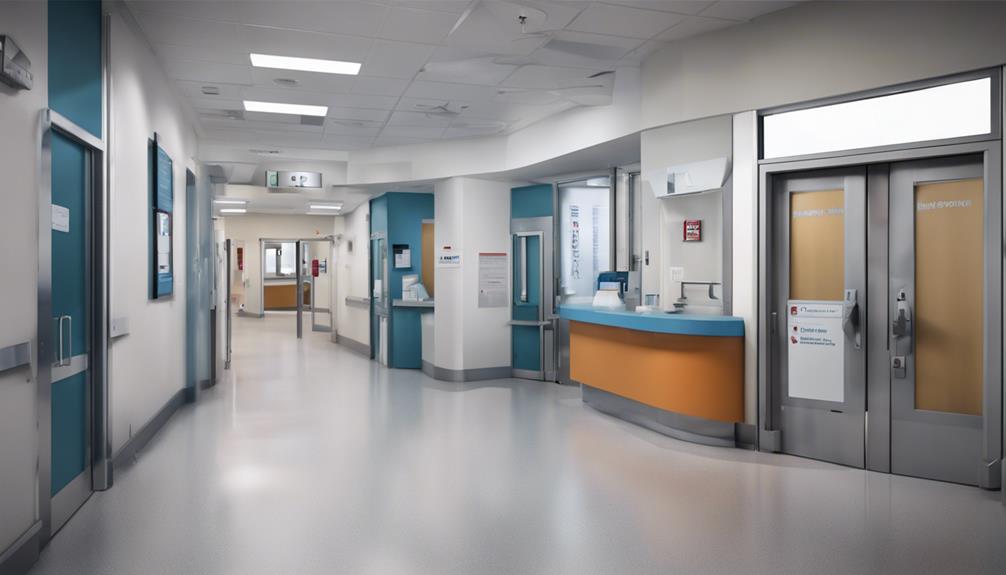Embarking on the health service in Scotland is like setting off on a journey with a detailed map in hand – knowing where to turn and what landmarks to look out for is key.
From deciphering the nuances of GP registration to mastering the art of accessing emergency care swiftly, there are intricate steps that can make a world of difference in one's healthcare experience.
So, shall we unravel the secrets to journeying through Scotland's health service intricacies like seasoned travelers?
Key Takeaways
- Register with a local GP for comprehensive primary healthcare services.
- Access emergency care services through NHS 24 or A&E for urgent medical needs.
- Utilize diverse healthcare options including public and private providers.
- Maximize benefits by updating information, using free NHS services, and understanding patient rights.
Registering With a General Practitioner (Gp)
When considering accessing primary healthcare services in Scotland, registering with a local GP is a necessary initial step. This process is essential for individuals to access a wide range of GP services, ensuring they receive the necessary healthcare support. Registration with a GP in Scotland is straightforward and free of charge, allowing residents and eligible foreigners to benefit from nearly all treatments without any additional cost.
Additionally, students enrolled in full-time courses in Scotland receive free care from their registered GP, further emphasizing the importance of this initial registration step.
Universities in Scotland play an important role in guiding individuals towards suitable GPs by providing them with relevant information to facilitate the registration process. By registering with a local GP, individuals gain access to extensive primary healthcare services, promoting overall well-being and timely medical assistance when needed. This free and accessible registration process underscores the Scottish healthcare system's commitment to ensuring that everyone can easily navigate and benefit from essential healthcare services.
Accessing Emergency Care

Accessing emergency care in Scotland is a fundamental aspect of the healthcare system, ensuring individuals receive prompt and free medical assistance when needed. The NHS in Scotland provides thorough emergency care services, including accident and emergency treatment, at no cost to the patient. In situations where non-urgent medical advice is required outside of regular GP hours, individuals can contact NHS 24 by dialing 111. This service operates 24/7, offering telecare services that connect individuals with appropriate healthcare resources. It serves as a valuable resource for obtaining medical guidance and support when traditional healthcare facilities are closed. Scotland prioritizes the accessibility of emergency medical assistance through services like NHS 24, ensuring that individuals can seek help whenever the need arises.
| Emergency Care Services in Scotland | Details |
|---|---|
| Cost | Free for all individuals |
| Contact Information | Dial 111 for NHS 24 services |
| Availability | 24/7 access to telecare services |
| Purpose | Connect individuals with healthcare |
Understanding Healthcare Services

Understanding healthcare services in Scotland encompasses a diverse range of options for accessing medical care, including primary care through General Practitioners, hospital services, walk-in centers, and community health resources. In Scotland, the National Health Service (NHS Scotland) plays a central role in providing essential medical services to residents. This includes primary care services offered by GPs, hospital care, mental health services, and access to specialist services.
Patients have the choice to access both public and private healthcare providers, with services such as cosmetic surgery and fertility treatments available through private providers in addition to the NHS. Registering with a local GP is crucial for individuals seeking to access most healthcare services in Scotland, as GPs act as the primary point of contact for medical care and can refer patients to specialist services or hospital care when needed.
Navigating Health Service Facilities

Health service facilities in Scotland encompass a network of GP practices, hospitals, walk-in centers, and community health services tailored to meet the diverse healthcare needs of the population. These facilities offer a wide range of medical services, from routine check-ups to specialized treatments. Access to these services is typically free for residents, ensuring essential healthcare support is available to everyone.
Exploring health service facilities involves understanding the roles of different healthcare providers and knowing how to access the specific services you require. GP practices serve as the first point of contact for general health concerns and referrals to specialists or hospitals when needed. Hospitals provide more complex care, including surgeries and emergency treatments. Walk-in centers offer immediate attention for minor injuries or illnesses, while community health services focus on preventive care and support within local communities.
Maximizing Healthcare Benefits

Shifting from exploring health service facilities, we now focus on maximizing healthcare benefits through strategic utilization of the free services provided by NHS Scotland. When utilizing NHS services in Scotland, it is essential to register with a local GP to access a wide range of medical services, including mental health services. By updating your contact information with healthcare providers, you confirm timely communication and appointments for efficient care delivery. Take advantage of NHS dental services for extensive oral health care and NHS prescriptions for necessary medications, all at no additional cost. Understanding your patient rights and expectations is vital, including the right to safe and effective treatment, dignity, respect, and involvement in care decisions. By leveraging these free healthcare services effectively, you can enhance your overall well-being and make the most of the healthcare benefits offered by NHS Scotland.
| NHS Services in Scotland | |
|---|---|
| Medical Services | General Practice, Hospital Care |
| Mental Health Services | Community Health Services, NHS Prescriptions |
Frequently Asked Questions
What Is the Healthcare System Like in Scotland?
The healthcare system in Scotland is funded through taxation, offering free medical services to all. NHS Scotland provides primary, hospital, mental health, and specialist care. Private options exist for quicker access. Access is through GPs, hospitals, walk-in centers, and other providers.
How Does the Care System Work in Scotland?
In Scotland, the care system operates through taxation, offering free medical services to all. Access is mainly via a local GP for various services like primary care and specialist treatments. Patients have the freedom to choose providers.
What Is the Healthcare Quality Strategy for NHS Scotland?
The Healthcare Quality Strategy for NHS Scotland aims to enhance patient experiences, clinical effectiveness, and safety within the system. It emphasizes person-centered care and patient involvement in treatment decisions. Clear objectives and targets drive continuous improvement aligned with national health priorities.
Does Scotland Have Better Healthcare Than England?
We believe Scotland provides better healthcare than England based on higher patient satisfaction, increased per capita healthcare investment, lower mortality rates, shorter wait times for surgeries, and a focus on prevention. These factors contribute to superior health outcomes.
Conclusion
To sum up, mastering the intricacies of Scotland's healthcare system is akin to traversing a complex labyrinth. By familiarizing ourselves with the various services and facilities available, we can confidently access the care we need.
Just as a skilled navigator charts a course through turbulent waters, understanding the healthcare landscape in Scotland allows us to steer towards better health outcomes with precision and ease.









